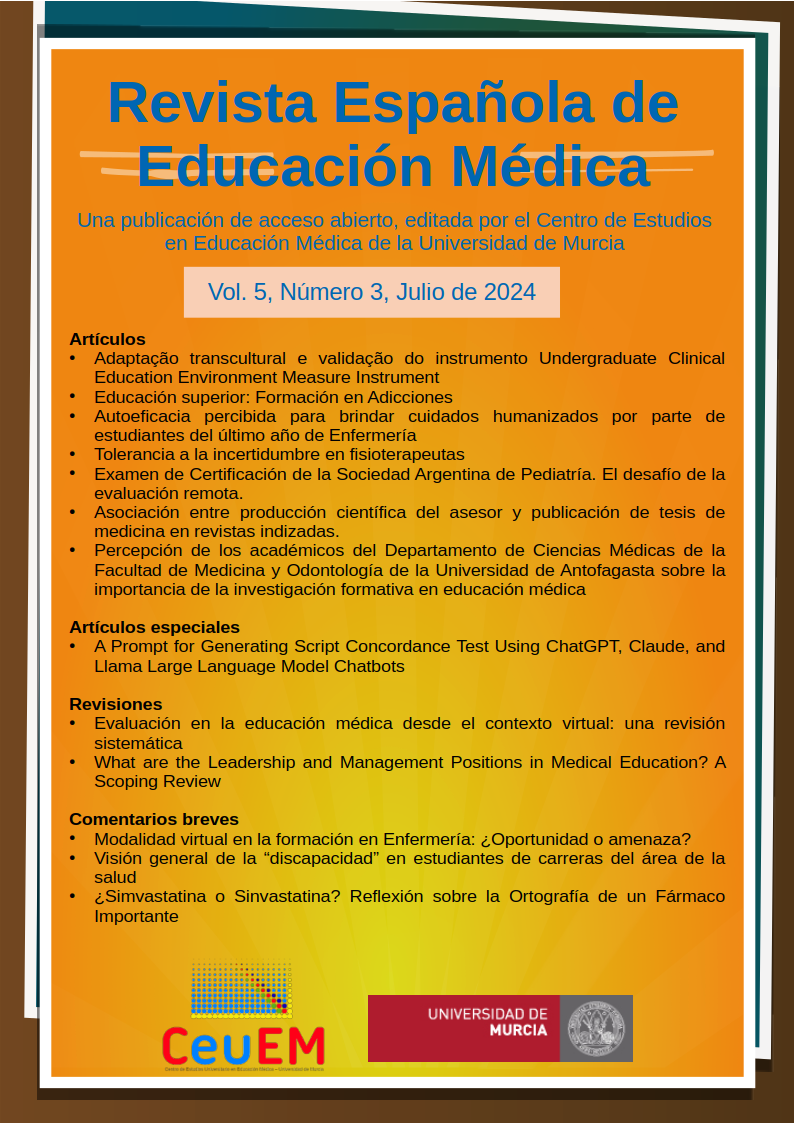Higher education: Training in Addictions
Abstract
The Complutense Drug Addiction Institute was created to train professionals who worked with addicted people, due to the problem of the heroin pandemic that caused high youth mortality in the 1980s.Taking a tour of the training given to medicine, nursing and psychology professionals who joined forces to respond to social needs, makes us glimpse how the problem of addictions has been changing over time and with it the training of professionals. The general objective is to reflect the changes in teaching and the training that is currently being given. For this, retrospective descriptive qualitative methodology has been used, through documentary analysis. The results show the need to continue training in health professionals and highlight the lack of postgraduate training in Higher Education, especially focused on the public system. It is concluded that the need for continuity of training in health professionals is evident since it is shown as a fundamental improvement in professional praxis and as an essential tool to treat addiction problems that emerge today.
Downloads
Metrics
-
Abstract380
-
pdf (Español (España))269
-
pdf269
References
Beneit J, García C, Mayor L. Intervención en drogodependencias, un enfoque multidisciplinar. Madrid: Síntesis, 1997.
Ferrer X. y Sánchez M. La formación de profesionales en materia de drogodependencias. Comunidad y Drogas, 1987; 5(6), 63-82.
García C. Análisis de un programa de formación de profesionales en drogodependencias [tesis doctoral]. Universidad Complutense de Madrid, 1992. https://dialnet.unirioja.es/servlet/tesis?codigo=269686
Molina MP. Introducción al análisis documental y sus niveles: el análisis de contenido. Boletín de la ANABAD 1989; 39(2), 323-342. https://dialnet.unirioja.es/servlet/articulo?codigo=798857
Becoña E. (2020). Evolución del consumo, adicción y drogas en España [conferencia]. Ciclo de Conferencias del 30 Aniversario Proyecto Hombre, Santiago de Compostela, España. https://www.youtube.com/watch?v=KDVMxmSzgvY&list=PLvJm0MHG1kp-G4PS0r6L-8wFfMH-z3pcl&index=5
El modelo Minnesota en el tratamiento de adicciones: qué es y cómo funciona. Psicología y Mente, 2023. https://psicologiaymente.com/clinica/modelo-minnesota-tratamiento-adicciones
Real Decreto 861/1985, de 24 de abril, por el que se aprueban los Estatutos de la Universidad Complutense de Madrid. (1985). Boletín Oficial del Estado, 139, de 11 de junio de 1985, 17.585 a 17.602.
Carretero Díaz, M. Á., García Klepzig, J. L., Cardós Alonso, M. C. y Gómez Sánchez, M. C.(2020). Cuidador Complutense [proyecto de innovación docente]. UniversidadComplutense de Madrid. https://www.ucm.es/cuidadorcomplutense/
Observatorio Europeo sobre Drogas. European Monitoring Centre for Drugs and DrugAddiction. https://www.euda.europa.eu/index_en
Milkman H, Shaffer H. (1985). The addictions. Multidisciplinary perspectives and treatments. Lexington Books.
Ministerio de Universidades. https://www.universidades.gob.es/portal/site/universidades/
Ley Orgánica 20/1985, de 25 de julio, de prevención y asistencia en materia de sustancias quepuedan generar dependencia. 1985; https://www.boe.es/eli/es-ct/l/1985/07/25/20
Asociación Proyecto Hombre. 30 aniversario Asociación Proyecto Hombre. 2020; https://proyectohombre.es/30aniversario/
Copyright (c) 2024 Servicio de Publicaciones de la Universidad de Murcia

This work is licensed under a Creative Commons Attribution-NonCommercial-NoDerivatives 4.0 International License.
The works published in this magazine are subject to the following terms:
1. The Publications Service of the University of Murcia (the publisher) preserves the economic rights (copyright) of the published works and favors and allows them to be reused under the use license indicated in point 2.
2. The works are published under a Creative Commons Attribution-NonCommercial-NoDerivative 4.0 license.
3. Self-archiving conditions. Authors are allowed and encouraged to disseminate electronically the pre-print versions (version before being evaluated and sent to the journal) and / or post-print (version evaluated and accepted for publication) of their works before publication , since it favors its circulation and earlier diffusion and with it a possible increase in its citation and reach among the academic community.



















